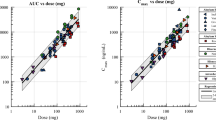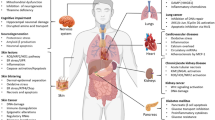Abstract
The dioxin receptor is a ligand-activated transcription factor with multiple functions in xenobiotic metabolism, development and dioxin toxicity. The focus here is on its roles in regulating endo- and xenobiotic conjugation by UDP-glucuronosyltransferases, and in dioxin-mediated cancer progression. Dioxins are poorly metabolized leading to sustained receptor activation and deregulation of target genes.
Similar content being viewed by others
Literatur
Bock KW, Bock-Hennig BS (2010) UDPglucuronosyltransferases (UGTs): From purification of Ah-receptor-inducible UGT1A6 to coordinate regulation of subsets of CYPs, UGTs, and ABC transporters by nuclear receptors. Drug Metab Rev 42:5–12
Gu YZ, Hogenesch JB, Bradfield CA (2000) The PAS superfamily: Sensors of environmental and developmental signals. Ann Rev Pharmacol Toxicol 40:519–561
Bock KW, Josting D, Lilienblum W et al. (1979) Purification of rat liver microsomal UDP-glucuronyltransferase. Separation of two enzyme forms inducible by 3-methylcholanthrene or phenobarbital. Eur J Biochem 98:19–26
Iyanagi T, Haniu M, Sogawa K et al. (1986) Cloning and characterization of cDNA encoding 3-methylcholanthrene inducible rat mRNA for UDP-glucuronosyltransferase. J Biol Chem 261:15607–15614
Mackenzie PI (1986) Rat liver UDP-glucuronosyltransferase. Sequence and expression of a cDNA encoding a phenobarbital-inducible form. J Biol Chem 261:6119–6125
Mackenzie PI, Bock KW, Burchell B et al. (2005) Nomenclature update for the mammalian UDP glycosyltransferase (UGT) gene superfamily. Pharmacogenet Genomics 15:677–685
Bock KW (2012) Human UDP-glucuronosyltransferases: Feedback loops between substrates and ligands of their transcription factors. Biochem Pharmacol 84:1000–1006
Yaeger RL, Reisman SA, Aleksunes LM et al. (2009) Introducing the ‘TCDD-inducible AhR-Nrf2 gene battery’. Toxicol Sci 111:238–246
Court MH, Zhang X, Ding X et al. (2012) Quantitative distribution of mRNAs encoding 19 human UDP-glucuronosyltransferase enzymes in 26 adult and 3 fetal livers. Xenobiotica 42:266–277
Consonni D, Pesatori AC, Zocchetti C et al. (2008) Mortality in a population exposed to dioxin after the Seveso, Italy, accident in 1976: 25 years of follow up. Amer J Epidemiol 167:847–858
Bock KW, Köhle C (2006) Ah receptor: Dioxin-mediated toxic responses as hints to deregulated physiologic functions. Biochem Pharmacol 72:393–404
Mitchell KA, Elferink CJ (2009) Timing is everything: Consequences of transient and sustained AhR activity. Biochem Pharmacol 77:947–956
Author information
Authors and Affiliations
Corresponding author
Additional information
Karl Walter Bock Apotheker und Arzt. Promotion zum Dr. med an der Universität Freiburg. 1965–1968 Assistent am Biochemischen Institut der Universität Freiburg. 1968–1970 Stipendiat am Department für Zellbiologie der Rockefeller University, New York, USA. 1970–1977 Assistent am Institut für Toxikologie der Universität Tübingen. 1973 Habilitation für Pharmakologie und Toxikologie an der Universität Tübingen. 1977-1987 Leiter der Abteilung Biochemische Pharmakologie am Zentrum für Pharmakologie und Toxikologie der Universität Göttingen. 1987–2000 Direktor des Instituts für Toxikologie der Universität Tübingen.
Rights and permissions
About this article
Cite this article
Bock, K.W. Fremdstoffmetabolismus und Toxizität von Dioxinen. Biospektrum 18, 593–595 (2012). https://doi.org/10.1007/s12268-012-0233-5
Published:
Issue Date:
DOI: https://doi.org/10.1007/s12268-012-0233-5




